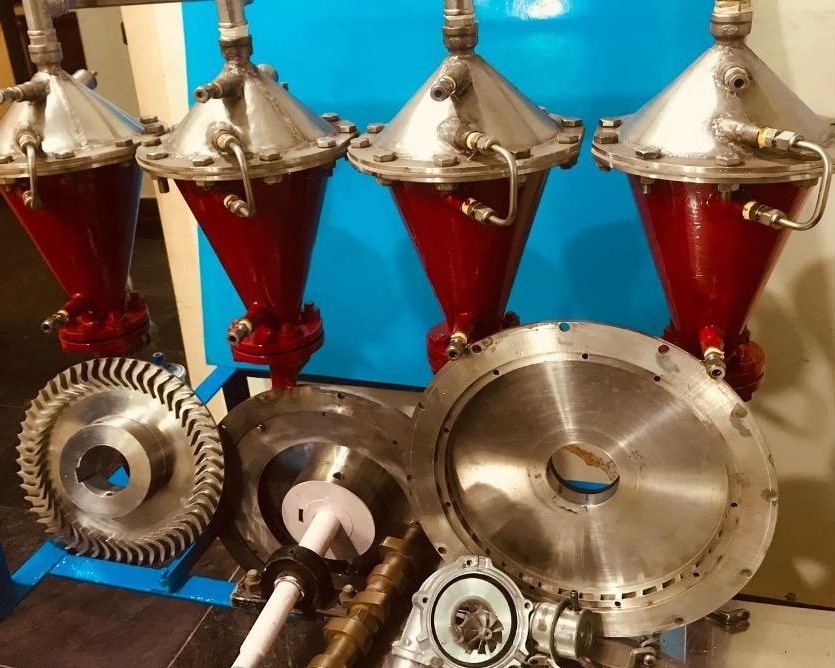Today's globalized world would not be able to function without freight transportation, with billions of tons of cargo transported every year. However, the freight transportation sector is also responsible for 8% of global greenhouse gas emissions, and the sector must play its part in decarbonizing its operations to ensure sustainability.
One of the most important steps in decarbonizing the freight sector is to replace the diesel-powered engines of heavy-duty transport vehicles, such as trucks, trains, and ships, with zero-emission alternatives. This is a major challenge because the replacement engine must have sufficient torque to pull heavy loads and be operable in a wide range of weather and temperature conditions without costing significantly more than the conventional internal combustion engine.
"Hydrogen fuel has been proposed as an alternative, but hydrogen fuel cell engines can be delicate and cannot operate in very high or low temperatures," shares Reginald Fubara, the founder of HyOrc Corporation. They also require hydrogen fuel purity of over 99.99%. On the other hand, burning hydrogen with air produces NOx, a toxic greenhouse gas, as air is 78% nitrogen. This is also true for hydrogen internal combustion engines (ICE). To address these concerns, HyOrc Corporation has created the HyOrc Engine, a revolutionary, zero-carbon emissions engine designed to burn hydrogen fuel of at least 97% purity, with the only byproduct being water.

The engine's name comes from hydrogen and the Organic Rankine Cycle, which is a patented turbine technology in which heat generated during the combustion phase is harnessed
to drive the secondary stage of the Rankine cycle process. This significantly enhances the engine's overall efficiency, as the heat produced by burning the hydrogen fuel is used to increase the engine's output, achieving an outstanding 45% efficiency for the HyOrc Engine. At the final stage, a turbocharger collects excess compressed vapor from the Organic Rankine Cycle, further enhancing efficiency.
The HyOrc team developed a turbine design that is used for electricity production. This has been adapted to become the heart of the HyOrc Engine. Since the design is derived from that of a power plant turbine, the HyOrc Engine is suitable for large, heavy-duty vehicles, such as freight trucks and locomotives, which require a lot of torque but not rapid acceleration.
Reginald is an experienced tech startup entrepreneur who began in software development before transitioning to power plant construction for renewable energy. The HyOrc engine project is spearheaded by Manoharan Sundaralingam, head of R&D and a veteran inventor of renewable technologies, and Shinichi Hirano, the former CTO of Hyzon Motors who has previously worked at Ford and Mazda, developing hydrogen fuel cell propulsion technology.
Not only has HyOrc Corporation solved the issue of designing a hydrogen-powered, zero-emissions engine for freight vehicles, but it can also incorporate a way to obtain hydrogen fuel affordably. The HyOrc team has other technologies that recover hydrogen from municipal waste at a cost of $0.50 per kilogram, making it more affordable than diesel fuel. This is known as blue hydrogen, in contrast with green hydrogen, which is produced via electrolysis of water via renewable energy, separating the hydrogen from the oxygen. According to Reginald, green hydrogen is much more expensive to produce, while blue hydrogen also helps solve the issue of solid waste that would otherwise be incinerated or dumped in landfills.

"I believe sustainability is about taking incremental, realistic steps towards the goal of decarbonization, rather than having pie-in-the-sky proposals," Reginald says. "It's also about having the willpower to turn these ideas into reality. The HyOrc Engine is poised to make a transformative difference in the freight and heavy-duty vehicle industry, providing a sustainable, efficient, and an affordable alternative to the very polluting diesel engines mostly in use today. We aim to offer fleet owners the chance to replace their diesel vehicles with HyOrc-equipped ones at roughly the same cost. That way, they can help save the planet while remaining profitable."
ⓒ 2025 TECHTIMES.com All rights reserved. Do not reproduce without permission.

![Best Gaming Mouse For Gamers With Smaller Hands [2025]](https://d.techtimes.com/en/full/461466/best-gaming-mouse-gamers-smaller-hands-2025.png?w=184&h=103&f=6fd057ef777bd39251d4e7e82e9b23f1)


![Best iPads that Students Can Use in School [2025]](https://d.techtimes.com/en/full/461431/best-ipads-that-students-can-use-school-2025.jpg?w=184&h=103&f=516289300e12e9647ef3d5bd69f49b70)
